
Scholarship Recipients 2013
(a PBK key indicates awardees who weren't able to attend the award dinner)

Abigail is studying two streams of Mexican migration to the United States from Southern Mexico, 1980s to the present. Her dissertation helps explain why migrant communities--as well as those "left behind"--are not all of a kind. Her two-year comparative historical study of two transnational Mexican migrant communities from Oaxaca to Southern California shows the different paths taken by the "Temporo" and the "Permano" migrants. The latter became service workers in large urban centers like Los Angeles, settling permanently in California and calling it their "second homeland." In contrast, the "Temporo" migrants circled in and out of rural farm work, remaining temporary, on the fringes of U.S. society and tied economically to Mexico. She argues that political institutions in Mexico and the United States play key roles in shaping the different paths of these communities, "pulling" and "pushing" in very different ways.
One of her recent publications is "The Quiet Insubordination of Staying Home: Rethinking Women Who 'Stay Behind.'" In it she shows how staying home, though it is often perceived as passive, can be a strategy "to defy both exploitation and male domination. Even when they do not migrate, women shape migration, both to their benefit and, unintentionally, to their detriment."
Her professors note that "her graduate school record is stunning" and that her dissertation is "pathbreaking" and "both ambitious and original."

Emily began her application essay with this picture: "The sun had just risen over Surprise Lake in northern Wisconsin. With a huge grin and a snorkel on my face, I dove in. I spent hours traversing [the lake], studying its inhabitants, and was thrilled by my discoveries, fish guarding their eggs and dragonfly eggs floating on the surface. The satisfaction did not disappear . . . even when my mom cut out chunks of my severely entangled hair and scolded me for ruining my long curls."
Emily's research "focuses on the ways that humans are impacting the seemingly pristine Antarctic marine environment." She is "exploring possible shifts in the marine nitrogen cycle and the effects of climate change on Antarctic seals." From her research results she hopes to "provide scientists and policy makers with insights into how the current rapid warming in the Antarctic may affect indicator species."
In addition to her academic studies, she is seizing many opportunities to teach. Most recently, she has become involved in a project initiated by Stanford graduate students to establish a field school on a remote property of southeastern Alaska surrounded by preserved lands where students will have the opportunity to "connect the products and services of everyday life, such as food, water, and energy, to their origin, a connection that is challenging to make on a college campus.
Her professors note that her work is "cutting edge, innovative, and ambitious" and that she "has demonstrated tremendous leadership potential."
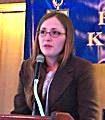
Sarah's MFA thesis will consist of "a collection of short stories that focus on the region known as the 'rust belt,' mainly centering on the area of northern Appalachia," where she grew up and a place she needs to write about. Through her short stories she hopes to "cast a shadow over simplistic, popular stereotypes in order to advance an alternate perspective that is multifaceted, heartbreaking, and beautiful." In her stories, "the past continues to act upon the present."
In an excerpt from "Greetings from the New River Gorge, West Virginia," narrated by a young girl, we learn that "this excursion was a big deal for another reason as well. Around this time, my parents stopped touching. And when they did accidentally bump one another during a maneuver around the kitchen sink or graze the other's hand when passing the butter, they looked startled and annoyed, so helpless, as if they were already ghosts haunting each other's lives."
Sarah's CV shows her rich experience as a teacher. She has "assisted a fifth-grade classroom in a Brooklyn public school" and has "taught classes in writing, film criticism, immortality, and creativity to Girl Scouts, Chinese American students, and the gifted and talented." She has also worked with incarcerated youth. Currently, she's teaching an advanced-level course for undergraduates at SFSU.
Her professors note that she "writes strongly of place and of the broken relationships that litter the landscapes." They also note her "strength of character, her talent as a writer, and her sharpness in critical thinking."
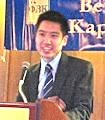
Here is the first sentence of Andrew's application: "My goal is to program living cells using DNA and RNA as easily as you can write an iPhone app." Many of us on the scholarship committee couldn't write an iPhone app to save our souls--yet Andrew's application made his aims and his research clear.
As he noted in his essay, "Everyone's a scientist." The scientific method "is central to how we learn about and interact with the world." Through his research and his career, he aims to "combine laboratory research with science education and public engagement." His goal is to have his discoveries "translated into products and treatments people can benefit from, not languish in the scientific literature."
His teaching experience includes teaching more than 250 students as a TA in seven courses (and his evaluation summaries are outstanding). He has also volunteered at the Tech Museum in San Jose, has led small-group labs at local high schools, and has operated an interactive cheek cell imaging booth at the Bay Area Science Festival. His goal is to "engage the public, helping everyone find their inner scientist" (and "their" is perfectly grammatical there; don't Miss Thistlebottom me).
His professors note that he has "demonstrated a great enthusiasm in the classroom and even more importantly a passion for his students' learning" and that his research and training "are very interdisciplinary, leading to substantial advances to biotechnology by effectively bridging chemistry, biology, and engineering."

Carrie is studying anthrax and coinfection trade-offs from an immunological perspective, specifically examining the seasonal aspects of host susceptibility. Most immunological studies in wildlife have focused on "using immunology as a tool to measure the prevalence of disease rather than as a means toward understanding the mechanisms of disease in wildlife." Carrie's research involves "the first longitudinal study simultaneously examining coinfections, seasonality, and complex immunity in wildlife hosts." "Despite anthrax being an ancient disease found worldwide that threatens human and animal health, biodiversity, economics, and agricultural security, very little is understood about its ecology."
In addition to her research, Carrie has also been teaching and mentoring students. She is teaching her eighth semester at Cal and is directly and closely mentoring sixteen of her own students as they complete a year-long senior research project in their environmental sciences major. She obtained her California veterinary license in 2005. Her other interests include "fine art photography, drawing, road and cyclocross bicycling, long-distance running, hiking with dogs, reading, raising a toddler, and doing toddler-related laundry."
Her professors note that she "has an impressive array of accomplishments," "boundless enthusiasm, and commitment to applied science." She has "established an expertise in anthrax ecology at a frightening pace."
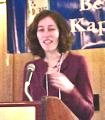
Rachel is studying "the parallel and competitive processes in low-level vision and their impact on awareness." As she noted in her application, "We can distinguish friends from strangers, a car coming toward us from a car driving away from us, and a green banana from an overripe one just by looking." Her research aims to explain how we can see such a huge variety of visual features literally in the blink of an eye.
A key neural strategy for such real-time vision is parallel processing. Although different areas of the brain process visual information separately, we somehow perceive that information as a unified experience. Her work has "suggested new ways of understanding and measuring parallel information processing in the brain and its integration in perception."
In a concluding paragraph she wrote: "I am a neuroscientist because I am compelled by the power of experimental inquiry and analytical tools to make progress in understanding--essentially--ourselves. . . . As an investigator of the mind, I have much in common with my actor parents and English-major college roommates. Though the forms of our answers may differ, all of us ask, What is our experience like, and why."
Her professors note that she has "outstanding research abilities and scientific curiosity" as well as "fearlessness in tackling extremely challenging research problems." "She is also a very talented scientific writer, . . . innovative, meticulous, and creative."

Talya is studying epic poetry in the period 1482-1674. She focuses on the Muslim figures that are a frequent presence in the epic poetry of the period. "In these texts, Muslims function as both enemies and reflections of their Christian counterparts." Her dissertation challenges the view that Muslim characters are marginal figures in these stories. Instead, she argues that "epic tells the story not of victory, but of encounter with other cultures" and that, "so far from attempting to silence the voices of its Muslims, epic literature depends on them," using those voices to "build a narrative of shared and contradictory history."
Her hope is that her dissertation project "can offer an important new perspective to our [Western] modern political situation as well as the historical one behind it." She aims to counter the West's "general lack of knowledge about Muslim belief, practice, and history" and to show the "shared history" of Islam and the West.
Talya has been actively involved in the life of her department at Stanford as a member of various committees and councils. She's been a TA whose students describe her "enthusiasm as contagious and inspiring" and her classes as "challenging, dynamic, and rewarding."
Her professors call her "tireless, articulate, and collegial" as well as "stunningly well-prepared."
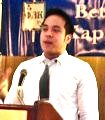
Josef's dissertation, "Forming Literary Expertise," explores the "shifting importance of both scientific and literary expertise in contemporary science policymaking." He focuses on "public education groups that aim to influence future policy by communicating expert scientific knowledge to the public through specific media channels, such as novels, recipes, and videogames." His interdisciplinary work "brings together technical scientific research, media and cultural studies, and studies in the public understanding of science." He is committed to "politically conscious teaching by assisting students in critically examining the knowledge claims made in science debates."
Josef has been a TA and an associate instructor for various courses at UC Davis and UC Irvine, a webmaster and software development intern, and a technical writer--for Vinotheque Wine Cellars.
He is working in the UC Davis Humanities Innovation Lab, where he is at the "vanguard of digital humanist scholarly work."
His professors note that Josef's work is "rigorously interdisciplinary" and that he is "forging new connections across disciplines." In particular, Josef's "eagerness to push the boundaries of the humanities in many different directions . . . is quite inspiring."
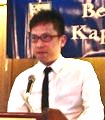
Ed's dissertation title explains his research interest and his hope: "Translational molecular virology: Towards the development of broad-spectrum antivirals." He is using the hepatitis C virus as an initial model of interest.
His interest in medicine was triggered by his mother's fight against chronic hepatitis C, which began when the family was still in Vietnam. In particular, he was inspired by a doctor who treated not just the disease but his mother. To learn to provide such understanding to patients in a "multifaceted cultural environment" like the United States, Ed is volunteering at the Pacific Free Clinic, which serves uninsured patients in the San Jose area. He is also eager to invent new medical devices and treatment modalities. As he wrote, "The success of my mother's treatment made me realize the importance of medical technology and drug research."
In addition to being a clinician and a scientist, Ed is mentoring the next generation of physicians. He set out to resuscitate the Stanford chapter of the American Medical Association. When he was elected president, he founded a program to give local high school students from disadvantaged backgrounds the opportunity to be exposed to a career in medicine. "From an idea to a one-day event, [there is] now . . . a multi-week program where each week, students learn about one medical specialty from a leading expert and engage in one hands-on session."
Ed's letters of recommendation include the following: "He is the most impressive student that I have encountered in over the ten years that I have been at Stanford. His intellect, creativity, productivity, passion, and dedication for biomedical science make him a model for what every physician-scientist should be." And this: "Were you to meet Mr. Pham, you would be struck by his humor and his humanity as well as his sharp intellect."

Aidan's research focuses on "public health interventions in developing countries, with particular emphasis on maternal and child health programs and policies that prevent morbidity and mortality for low-income populations." She has worked extensively in Brazil, which is a global leader in breast milk banking. Her research has never been conducted before, in Brazil or elsewhere. She explores who the donors are and, perhaps more important, why they donate.
Aidan notes that top-down interventions are sometimes imposed without a thorough understanding of the needs of underserved communities--hence, the need for qualitative research methods. An important part of her research is interviewing--listening to patients and understanding the circumstances they confront each day so that programs to provide care suit the needs of the people. She conducted her interviews in both English and Portuguese and translated, transcribed, and analyzed the interviews.
Outside the classroom and her research projects, Aidan consistently volunteered at the student-run community-based Suitcase Clinic and served as the Women's and Youth Clinic Co-Coordinator and "demonstrated leadership qualities as a class representative to the JMP (Joint Medical Project) Admissions Committee."
Her professors have called her "extraordinarily brilliant, passionate, self-motivated, and hardworking." She "embodies all the criteria for the scholarship--academic excellence, groundbreaking research, and outstanding future career potential." "Aidan's interests are genuine, and grounded in a belief that high-quality health care is a fundamental human right."

Alison is studying nineteenth-century race relations. The classic narrative about this period says that race relations were "characterized by an almost universal abhorrence of miscegenation." Her dissertation, in which she "intends to complicate this notion," shifts between historical narrative and analysis. "Much of it involves the stories of real and imaginary people, retrieved from sources such as antebellum travelogues, diaries, letters, and fiction." These sources show how the southern sexual double standard was supported by the twin pillars of racism and sexism.
Alison has had extensive teaching experience, from middle-school to university-level. As a pedagogy instructor, she participated in focus groups and panels about teaching in the humanities for Berkeley's Graduate Student Instructor conferences. Personally, she does not consider computer or printer problems to be "personal emergencies" that make it impossible to meet deadlines.
According to her professors, Alison is "one of those exceptional students who have it all: She is extremely smart, knows how to use her time consummately well, and has the drive to bring it all home in a dazzling career."
Alison volunteered as a speaker at the 2014 Asilomar Conference, on the toplc "A Plumb Craving for the Other Color: Race and sexuality in antebellum America"

Carly's dissertation research focuses on "the economic decisions made by prehistoric women, particularly the decisions made by hunter-gatherer women about food storage for the winter season." She examines the cost that storage imposed on women--the conflict between "the need to collect food for their children and the need to provide child care." Women who forage alone work more efficiently, but they can't be sure about the level of attention their children receive from "babysitters."
In addition to modeling food storage practices, Carly has used X-ray fluorescence spectometry to determine the geologic source of thousands of obsidian artifacts from her field sites and nearby Yosemite National Park. Consequently, she was recently placed in charge of the UC Davis anthropology department's obsidian laboratory. The goal of this multidisciplinary research is to "discover the history of peoples who left no written record of their lives."
Her professors especially note her "very strong quantitative and computer modeling skills . . . skills that are especially innovative in a social science where people generally do not take these approaches to understanding human behavior in the ancient past."
They also praise her ability to combine the goals of different parties (for example, the Bureau of Land Management's goal to protect archaeological information, the university's goal to facilitate undergraduate education, and professional anthropology's mission to understand the evolution of human societies).